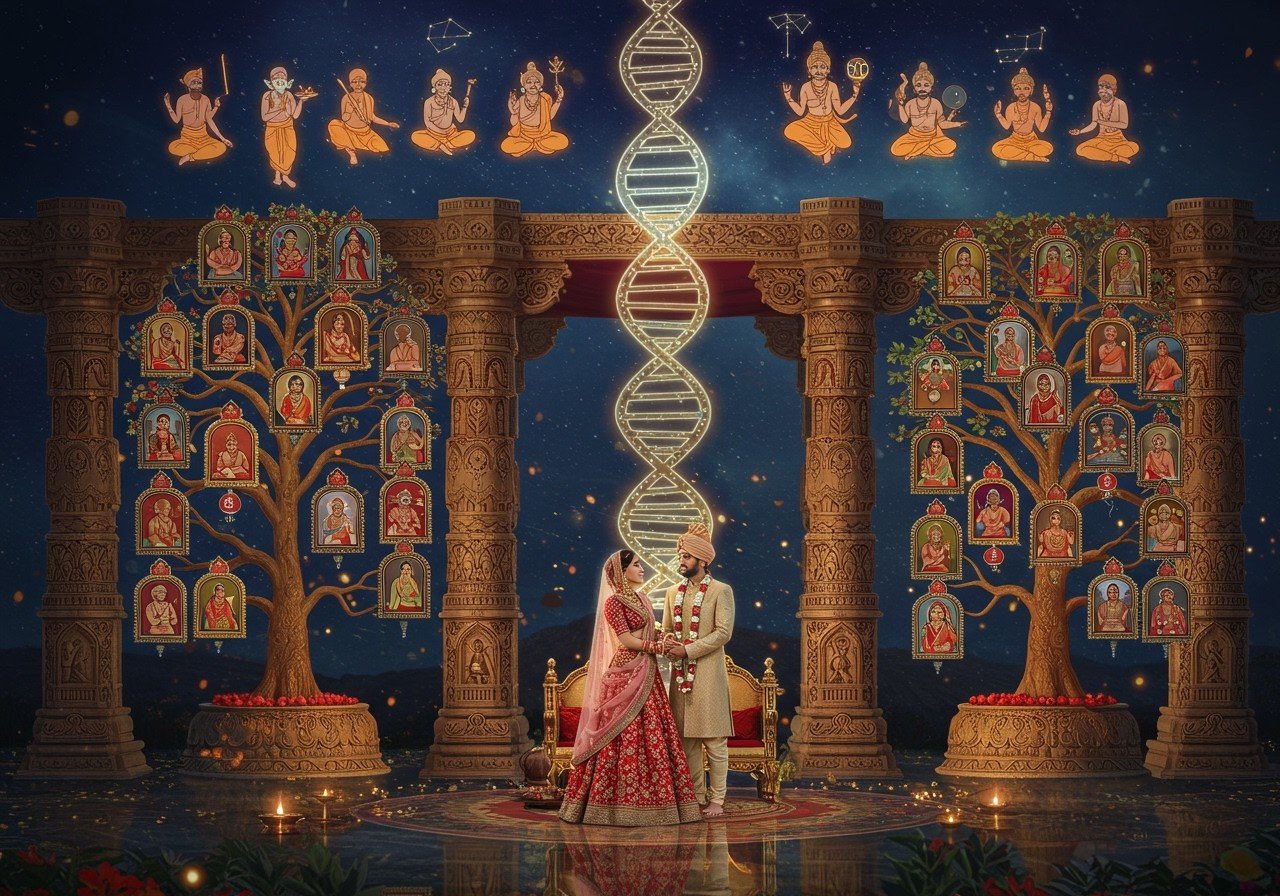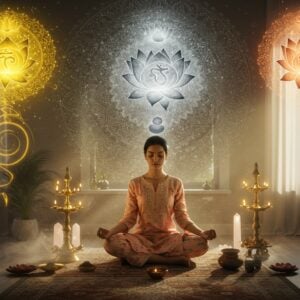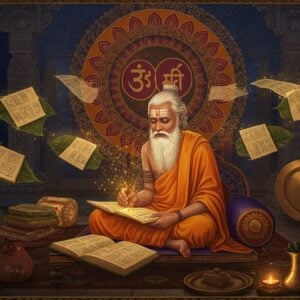Exploring the Intricacies of Gotra in Hindu Tradition

Gotra, a time-honored lineage system, holds deep cultural significance in Hindu society, especially in the context of marriage. It’s a thread connecting us to our ancestors, the revered rishis of ancient times. Understanding Gotra is essential, particularly when families are uniting through marriage, as it plays a vital role in shaping decisions.
Understanding Gotra
With roots tracing back to the Vedic period, the Gotra system categorizes lineages based on Brahminical ancestry. It functions as an exogamous unit – meaning those sharing the same Gotra are considered kin, like siblings, and traditionally, marriage within the same Gotra is avoided. This practice aims to maintain genetic diversity and uphold the purity of lineage.
Traditional Views on Same Gotra Marriage
Traditionally, marrying within the same Gotra is considered taboo. This stems from the belief in close kinship and potential genetic concerns. Religious texts emphasize adherence to Gotra-based marriage rules, reflecting the cultural emphasis on lineage purity, family honor, and societal standing. However, it’s important to note that exceptions and variations exist across different regions and communities.
Modern Perspectives on Gotra and Marriage
In contemporary India, the interpretation of Gotra in marriage is evolving. Advancements in genetics have led to questions about traditional restrictions. Increased education and urbanization have also shifted perspectives on Gotra-based marriage rules. The growing influence of legal and human rights perspectives is also contributing to greater acceptance of same Gotra marriages. Individuals today often find themselves balancing tradition with modern values in their marriage decisions.
Solutions and Considerations for Same Gotra Marriages
Couples facing same Gotra marriage restrictions have several paths to explore. Open and honest discussions within families and communities can often lead to a consensus. Sometimes, alternative rituals or ceremonies can accommodate traditional beliefs while allowing the marriage to proceed. Clear communication between families is essential to address concerns, expectations, and foster mutual understanding. The increasing acceptance of inter-caste and inter-religious marriages further demonstrates the changing social landscape.
Case Studies and Personal Narratives
Real-life stories offer valuable insights into the complexities of same Gotra marriages. Couples who have navigated these challenges share their experiences, offering solutions and support to others. The role of family support and community acceptance is often paramount in these narratives. These personal stories not only highlight the emotional and social implications of challenging traditional norms but also contribute to a wider dialogue about Gotra and marriage compatibility.
We at Poojn.in are committed to helping you honour your traditions.
Planning a wedding? Explore our exquisite collection of wedding items to make your special day even more memorable.
How Poojn.in Helps with Gotra and Marriage Compatibility
Poojn.in offers expert guidance and resources to navigate the complexities of Gotra-based marriage compatibility in the modern age. Our team of knowledgeable pandits provides reliable consultation services, empowering families to make informed decisions that respect both tradition and individual circumstances. We understand the deep-rooted cultural significance of these matters and are dedicated to supporting you with sensitivity and care.
For personalized assistance, connect with us:
- Call us at 03369029784 to speak directly with our team.
- Reach out via WhatsApp at 9476142738 for quick and convenient assistance. Our team is available to answer your queries and provide support.
- Visit our website www.poojn.in for in-depth information and a wealth of resources.
Our Comprehensive Gotra Services:
- Gotra Verification: We diligently verify Gotra details to ensure accuracy and reliability.
- Marriage Compatibility Check: Our experts assess compatibility between different Gotras, providing insights based on traditional guidelines.
- Explanation of Customs and Traditions: We offer clear explanations of relevant customs and traditions, fostering a deeper understanding of Gotra’s significance.
- Documentation Support: We provide documentation support, assisting you with any paperwork related to Gotra verification and marriage compatibility.
Looking for authentic puja items? Check our Rakhi collection and other sacred items on Poojn.in.
Poojn.in also provides a wide range of essential puja items for marriage-related ceremonies:
- Gotra-Specific Puja Samagri: We offer specialized puja items tailored to specific Gotras, ensuring authenticity and adherence to traditional practices. You can find all your puja needs at poojn.in for a truly personalized experience..
- Sacred Threads (Janeu): We offer high-quality sacred threads, an integral part of many Hindu rituals, crafted with respect and care. Poojn.in ensures that every item reflects our commitment to quality and tradition.
- Customized Puja Kits: Our personalized puja kits simplify the process of performing ceremonies, providing all the necessary items in one convenient package. Poojn.in makes traditional practices accessible and convenient for everyone.
- Traditional Marriage Ceremony Items: We offer a complete selection of traditional items for Hindu marriage ceremonies, ensuring that every detail reflects the richness of your heritage. You’ll find everything you need at Poojn.in to make your wedding truly special.
At Poojn.in, we seamlessly blend traditional wisdom with modern convenience, making it easier for families to follow Gotra guidelines while arranging marriages. Contact us for trustworthy guidance on Gotra matters and marriage compatibility.
Discover the perfect Topor Mukut set for your Bengali wedding at Poojn.in. Browse our selection here, here, here, and here.
Embracing Heritage and Modernity
Gotra stands as a symbol of our ancestral roots and cultural values, deeply intertwined with our identities and guiding our marriage traditions. As society progresses, our understanding of Gotra and marriage evolves, embracing both ancient customs and contemporary viewpoints. This ongoing journey allows individuals and families to honor their heritage while adapting to new realities. Conversations about Gotra and marriage become opportunities for learning, growth, and bridging the gap between tradition and progress.
By cherishing our cultural legacy and welcoming modern insights, we achieve a beautiful balance – a path towards understanding, respect, and acceptance. This ensures that the essence of our traditions thrives alongside the hopes and aspirations of today’s world. We invite you to explore the rich tapestry of your heritage with Poojn.in, where tradition meets modernity. Explore our collection of Marriage Ceremony Items.
FAQs on Gotra and Marriage Compatibility
Can individuals from the same gotra marry?
Traditionally, marriage between individuals from the same gotra isn’t favored, as they’re considered to share a close kinship, like siblings. This practice originates from the desire to preserve genetic diversity and prevent potential hereditary issues. However, societal views are evolving, and modern perspectives sometimes place greater emphasis on compatibility and understanding between partners. This shift reflects a growing balance between honoring tradition and recognizing individual circumstances.
Why is same gotra marriage not possible in Hindu traditions?
Same gotra marriage is discouraged in Hindu traditions primarily to maintain genetic diversity and mitigate potential health concerns in offspring. It’s a way of respecting ancestral lineage and upholding cultural beliefs passed down through generations. However, the interpretation of these traditions is changing over time, and individual families may hold varying views.
What solutions exist if two people from the same gotra want to marry?
If two individuals from the same gotra wish to marry, there are potential solutions to consider. Some communities may permit such unions with the consent of family elders and the performance of specific rituals. Seeking guidance from a knowledgeable priest can also be helpful in navigating these situations. Open communication and mutual respect within families are key to finding a path forward.
How does gotra influence marriage decisions today?
While traditional views on Gotra remain influential, modern considerations increasingly focus on compatibility, mutual understanding, and love between partners. Families often weigh both traditional and contemporary beliefs when making decisions about marriage. This evolving approach reflects the dynamic interplay between tradition and modern values.
Do modern perspectives accept same gotra marriages more readily?
Modern perspectives often prioritize individual choice and compatibility in marriage, sometimes placing less emphasis on Gotra. However, acceptance of same gotra marriages varies considerably among families and communities, with some being more open to change than others. The ongoing dialogue between traditional values and modern ideals continues to shape how Gotra is viewed in the context of marriage.
Are there exceptions to the gotra rule in marriage?
Exceptions to the Gotra rule do exist, based on specific community practices and interpretations of tradition. For instance, some families might permit marriage between individuals of the same Gotra if they are distant relatives or belong to different sub-gotras. The application of Gotra rules often reflects the nuanced diversity within Hindu traditions. Learn about the serenity and history of temple weddings by reading our blog post Bhoganandishwara Temple Weddings: Tradition, Serenity, and History and dive into the architectural wonders of Bhutanatha Temple with Bhutanatha Temples: Architecture, History, and Significance Explored.
What should couples consider if they face gotra-related challenges in marriage?
Couples encountering Gotra-related challenges should prioritize open communication with their families, seek guidance from knowledgeable elders or counselors, and consider both traditional values and their own personal beliefs. Finding a respectful balance between honoring tradition and pursuing their happiness is crucial. Remember, building strong relationships involves mutual understanding and respect for differing perspectives. Consulting with a Pandit or other knowledgeable figure can offer valuable insights and guidance.


